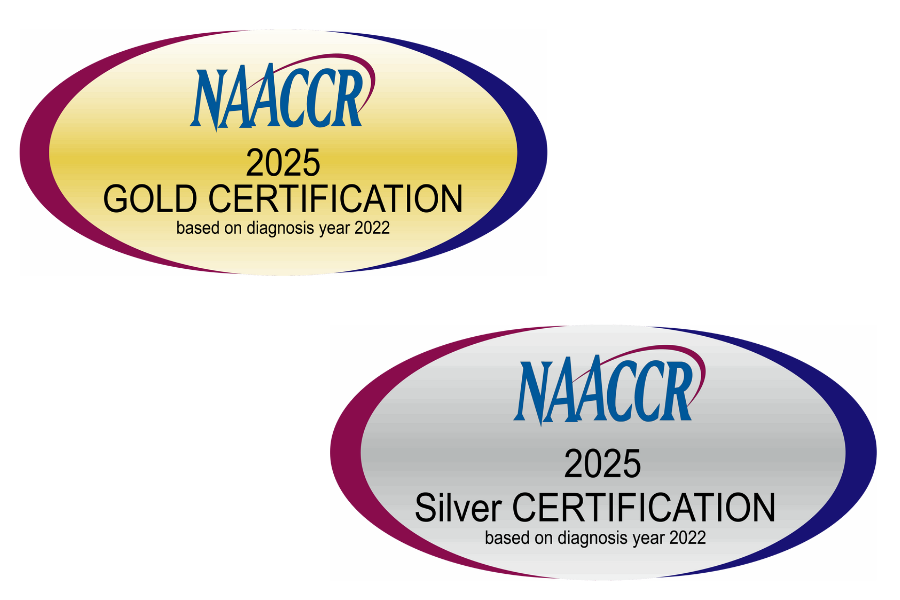GOAL: Provide high-quality data and proactive surveillance to support and inform cancer control efforts.

Cancer surveillance is based on timely and comprehensive collection, analysis, and reporting of population-based cancer incidence and survival. The data provides a critical profile of the cancer burden in a region and serves as the foundation for cancer prevention and control efforts, planning and resource allocation, and policies needed to reduce disease and death.
In the United States, the Centers for Disease Control and Prevention (CDC) National Program of Cancer Registries (NPCR) is the largest surveillance system representing 97% of the U.S. population. Together with the National Cancer Institute’s (NCI) Surveillance, Epidemiology, and End Results (SEER) Program, data for the entire U.S. population is collected on new cancer cases. This cancer data is primarily provided by state and territory central cancer registries.
The Nevada Central Cancer Registry (NCCR) is the central statewide, population-based registry maintaining data on all cancer patients residing in Nevada. NCCR collects cancer case data from multiple sources including hospitals, medical laboratories, screening facilities, and healthcare professionals diagnosing and treating cancer. NCCR submits data each year to NPCR and the North American Association of Central Cancer Registries (NAACCR), of which all central cancer registries in the U.S. and Canada are members. NAACCR annually reviews data from member registries to assure the quality, accuracy, and completeness of incidence data most recently awarding NCCR Silver Certification for 2021 and Gold Certification for 2022 data submissions.
As both the delivery of healthcare and collection of quality data are rapidly changing, so are the demands for maintaining and expanding high-quality surveillance systems. Also, there is a growing need to enrich cancer surveillance and research efforts to further identify different/dissimilar communities, including those located in frontier and remote areas of the state. The following objectives and strategies have been developed to strengthen Nevada’s capacity to collect, analyze, and disseminate cancer surveillance data.

Cancer Registry Certification
Cancer registries can receive certification from the North American Association of Central Cancer Registries (NAACCR) to indicate the quality and completeness of the cancer data collected and maintained by the registry. A gold certification requires 95% or higher data completeness while silver certification requires 90% or higher data completeness, among other accuracy requirements.
Objectives
Objective: Increase Nevada’s cancer data quantity and quality.
Strategies:
- Promote complete, accurate, and timely reporting to Nevada Central Cancer Registry (NCCR) for adult, adolescent, and pediatric cancers, including leveraging electronic health records (EHRs).
- Maintain Silver-Gold certification for NCCR.
- Increase the number of Oncology Data Specialists (ODS-C) working in Nevada through collaboration with community colleges that have HIT programs.
- Support policies expanding requirements for data collection including collection of patient sexual orientation and gender identity (SOGI) and clinical trials participation.
- Advocate for funding to support NCCR’s implementation of technology standards and SEER certification requirements.
- Support federal efforts to implement a centralized cloud-based data collection, processing, and storage option for state and regional central cancer registries.
Objective: Increase infrastructure for and timely use of Nevada’s data sources for proactive cancer epidemiological reporting to inform cancer control efforts and policy work.
Strategies:
- Use relevant socio-demographic and geographic indicators in cancer data analysis to highlight disparities in cancer incidence, detection, and outcomes.
- Incorporate health survey data from various sources, including the Nevada Behavioral Risk Factor Survey (BRFSS), Youth Risk Behavior Survey (YRBS), Nevada Adult Tobacco Survey, and WebIZ, to expand the analysis of trends in cancer incidence, mortality, and survival as they correlate with health behaviors, prevalence of cancer risk factors, and adherence to cancer prevention and screening guidelines.
- Integrate census-derived measures of socioeconomic status into the analysis of NCCR data to produce reports and maps characterizing and evaluating disparities in cancer risk, access and barriers to screening and proper cancer care, treatment and outcomes.
- Promote the availability and accessibility of de-identified cancer data from NCCR and statewide surveys through a variety of media, including user-friendly web applications to graphically display measures of cancer risk, mortality, detection, and outcomes statewide, by region, and zip code.
- Localize national cancer-related news using Nevada-specific data.
- Educate policymakers by distributing cancer data reports by legislative district prior to each legislative session.
- Advocate for funding for a position focused on cancer surveillance located at a research institution.
Indicators
Number of years NCCR achieves silver or gold certification from National Program of Cancer Registries (NPCR) reports/USCS.
Target: 5
Source: Nevada Central Cancer Registry
Number of cancer surveillance professionals at Nevada research institutions.
Baseline: 0
Target: 1
Source: Nevada Cancer Coalition
Annual number of cancer reports with epidemiological review produced.
Baseline: 0
Target: 5
Source: Nevada Cancer Coalition